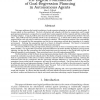Free Online Productivity Tools
i2Speak
i2Symbol
i2OCR
iTex2Img
iWeb2Print
iWeb2Shot
i2Type
iPdf2Split
iPdf2Merge
i2Bopomofo
i2Arabic
i2Style
i2Image
i2PDF
iLatex2Rtf
Sci2ools
AI
1998
Springer
1998
Springer
The Logical Foundations of Goal-Regression Planning in Autonomous Agents
This paper addresses the logical foundations of goal-regression planning in autonomous rational agents. It focuses mainly on three problems. The first is that goals and subgoals will often be conjunctions, and to apply goal-regression planning to a conjunction we usually have to plan separately for the conjuncts and then combine the resulting subplans. A logical problem arises from the fact that the subplans may destructively interfere with each other. This problem has been partially solved in the AI literature (e.g., in SNLP and UCPOP), but the solutions proposed there work only when a restrictive assumption is satisfied. This assumption pertains to the computability of threats. It is argued that this assumption may fail for an autonomous rational agent operating in a complex environment. Relaxing this assumption leads to a theory of defeasible planning. The theory is formulated precisely and an implementation in the OSCAR architecture is discussed. The second problem is that goal-re...
Related Content
| Added | 21 Dec 2010 |
| Updated | 21 Dec 2010 |
| Type | Journal |
| Year | 1998 |
| Where | AI |
| Authors | John L. Pollock |
Comments (0)

